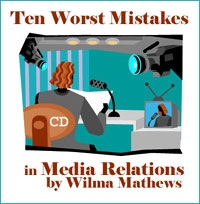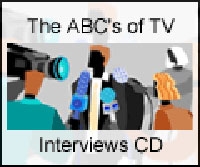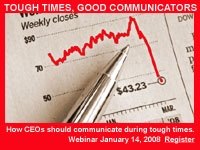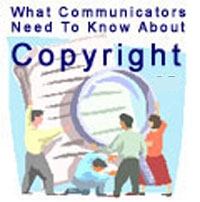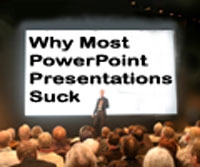Universal search changes everything! The advent of Google’s Universal Search has been called “the most radical change to its search results ever.” So, how do you take advantage of Google’s new approach that blends listings from news, blog, video, and image search among those it gathers from web search? In other words, how do you get found in all the right places? Purchase this CD and learn strategies and tactics for expanding the audience for their content through Google News, Yahoo! News, Google Blog Search, Technorati, Google Image Search, Flickr, YouTube, Yahoo Video and a growing variety of other sites.
Learning Topics:
- How to optimize, distribute and measure press releases, RSS feeds, images and video files
- Pick your target keywords for news, blog, image, video and web search engines;
- Position your keywords in crucial locations;
- Create original and unique content of genuine value, including text, images and video;
- Avoid search engine stumbling blocks;
- Build inbound links intended to help people find interesting, related content;
- Just say no to search engine spamming;
- Submit your Sitemap, RSS feeds, and videos to search engines and directories;
- Verify and maintain your listings; and
- Go beyond web search engines to include key vertical search engines.
Presented by:
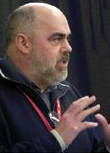 Greg Jarboe is the president and co-founder of SEO-PR, a search engine optimization firm and public relations agency with offices in San Francisco and Boston. He is also a partner in Newsforce, developer of an integrated suite of press release SEO tools.
Greg Jarboe is the president and co-founder of SEO-PR, a search engine optimization firm and public relations agency with offices in San Francisco and Boston. He is also a partner in Newsforce, developer of an integrated suite of press release SEO tools.
Greg is a frequent speaker at Search Engine Strategies, WebmasterWorld’s PubCon, and public relations conferences. He is also the news search, blog search and PR correspondent for the Search Engine Watch Blog.
Greg has more than 25 years of experience in public relations, marketing, and search engine optimization at Lotus Development Corp., Ziff-Davis, and other companies. He graduated from the University of Michigan, attended the University of Edinburgh, and worked on his Masters at Lesley College.
Can you speak the language of management? If not, here’s what you’re missing:
· The ability to add value in financial discussions with your boss and other top managers
· The skills needed to get your latest brainstorms adopted by key financial decision makers
· A plethora of financial tools that can help you make better business decisions
· An understanding of how your company’s financial performance affects its most critical asset: the workforce
In just 90 minutes, you’ll gain a new skill set¾and a potential ticket to the management table
Before you take a seat at the management table, you’d better have a solid understanding of key financial terms and accounting concepts. If not, you won’t be able to converse with those seated around you, because finance is the only language they speak.
Overcome the financial language barrier — for good — by attending this audio seminar. Using an easy-to-follow format, James Cole will demystify financial terminology, translate the accounting jargon and illustrate how communicators use financial information to increase their effectiveness.
Don’t miss this vital training event, designed to give you the skills and knowledge you need for holding your own with those who hold the company’s purse strings.
Key learning objectives:
· What’s at stake: Why every communicator should have a solid understanding of finance
· How a balance sheet, income statement and cash flow statement are used to analyze a company’s performance
· What management accounting tools CEOs use to monitor a company’s fiscal health, including EBITDA and pro-forma earnings
· How to cut through the jargon to translate complex financial data into meaningful and useful concepts
· Which financial terms are “must haves” for boosting your business vocabulary, including expenses, assets, capitalization, cash, accrual transactions and many more!
Audio Seminar Bonus: Understand the basics of financial decision-making
James answers real-life questions on:
- What communicators can do to help their organization’s employees better understand how their business works, with the objective of improving performance
- Tips to better communicate financial concepts to a lay audience
- Learning from the mistakes made by Enron
- The best tools to measure financial performance
Your audio seminar leader
James Cole is director of development for the Masonic Home of Virginia. His 25 years of professional experience include roles as auditor, founder, officer and consultant with numerous organizations throughout the U.S. He regularly speaks on such topics as financial reporting, taxes, accounting, fundraising and board development. He was a featured speaker at IABC’s 2005 International Conference in Washington, D.C., and Financial Communication Conference in New York.
No one has to tell you what a great speech is, right? You know one when you hear it.
Well you’re about to hear a bunch of them—and you’re going to learn from them, guaranteed.
Vital Speeches of the Day editor David Murray presents “Speechwriting Jam Session 2010,” 75 entertaining, inspirational and instructive minutes that will have the hair standing up on the same arm you’re scribbling notes with. We’ll discuss, even debate, what makes these great speeches great.
Through dramatic readings from winners of the 2010 Cicero Speechwriting Awards and highlight reels from the Vital Speeches YouTube site, Murray will help us reawaken the giants within us by sharing together excerpts from speeches contemporary and classic, famous and rare. (In the true spirit of an improvisational jam session, you’ll even have a chance to nominate some of your own YouTube favorites, so come prepared!)
You’ll come away from this session with:
• Concrete examples showing how leaders are addressing the issues of this particular moment in business, politics and society.
• A stockpile of examples—video and text—to show reticent speakers: rhetorical tactics that have passed the test and been pulled off by the best.
• Renewed enthusiasm and an expanded sense of what’s possible in leadership communication.
• And a goose bumps, guaranteed.
SESSION LEADER:
- David Murray writes and speaks about communication—business, political and personal. He’s editor of Vital Speeches of the Day, a monthly collection of the best speeches in the world. He writes about sports, people, politics and travel for magazines, newspapers and websites. publications and websites. And he discusses the communication life at his popular personal blog, Writing Boots.http://www.vsotd.comhttp://writingboots.typepad.com/writing_boots/profiles/http://writingboots.typepad.com/
Stop repeating these 10 proven mistakes when dealing with the media and managing your media relations program!
Ever since outlaw Jesse James wrote and issued the first news release, media relations practitioners have steadfastly refused to learn from the mistakes of their forebears.In James’s case, he didn’t take into account the suspicious and questioning nature of the reading populace, who viewed his bombastic news releases as early American “spin control.”
Learning Topics
Underestimating the intelligence of your audience is just one of the 10 major mistakes covered in this session. Others include:
- Not being a student of the media, keeping up with their changes needs and trends
- Confusing media output numbers with bottom-line outcome measures
- Annoying editors with misdirected and/or badly-prepared materials
- Not routinely evaluating your media relations programs and management
- Trying to substitute media relations for communication
Wilma answers real-world questions on:
- Holding the media accountable and keeping them from allowing bias or half-truths from creeping into news coverage, so that what is reported is straight, honest and fair
- How recent college graduates — with no contacts — can build relationships with the media
- The most effective ways to pitch
- Dealing with a less-than-objective journalist
- The best way to get to know a editor, writer or reporter
- The most important and effective tools in media relations
- The best day/time to pitch stories
- The least offensive way to bring a reporter’s error to his or her attention – and how to ask for a correction
- Pushing the envelope: How persistent you should be in making your pitch
- Teaching senior management the difference between a subjective, self-serving news item and a legitimate, content-rich press release
- Measures practitioners should routinely implement to measure results on the fly – especially during a crisis
- The biggest changes in media relations over the past 10 years
Presented by:
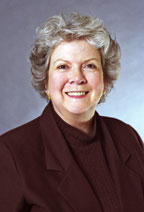 Wilma Mathews, ABC and IABC Fellow, works for Arizona State University as director of constituent relations. She also conducts media relations seminars, provides media training for corporate executives and is co-author of On Deadline: Managing Media Relations (4th edition, Spring 2006). Her background includes corporate communications and international public relations for AT&T/Lucent; nonprofit communication for two chambers of commerce and a medical center; and writing/editing for a newspaper and magazine. A national and international speaker, Wilma also contributes articles to trade publications and lectures on PR and media relations at ASU.
Wilma Mathews, ABC and IABC Fellow, works for Arizona State University as director of constituent relations. She also conducts media relations seminars, provides media training for corporate executives and is co-author of On Deadline: Managing Media Relations (4th edition, Spring 2006). Her background includes corporate communications and international public relations for AT&T/Lucent; nonprofit communication for two chambers of commerce and a medical center; and writing/editing for a newspaper and magazine. A national and international speaker, Wilma also contributes articles to trade publications and lectures on PR and media relations at ASU.
Have you ever watched your client on television and thought: “Oh, my! Look at how many chins he has, and what’s that terrible glare coming off his shirt and forehead? I never noticed in our meetings that he was that heavy. He also looks scared to death – and why does he keep licking his lips?” You tried to coach him on his message. In fact, you did all you could do to help him develop sound bites, and now you can hardly concentrate on the message with the way he looks, because he is doing so many distracting things.
This CD will teach you how to effectively coach your clients and colleagues for appearances on TV, both live and prerecorded. It will teach you when and how to offer praise and criticism without being offensive. And it covers how interviewees should dress, posture themselves and provide effective message delivery. Your purchase also includes a slew of extras – at no extra cost!
Learning Topics:
- The tricks of the trade to help people appear calm and confident on camera, even if they are not
- How to look natural — from make-up to body language and movements
- Tips and techniques to help prevent some of the unexpected distractions that can prohibit your true message from getting out to your audience
- How to motivate your clients and colleagues to improve their media performances
- How to tactfully and effectively learn to stress the need for “rehearsal”
TJ answers real-world questions on:
- Suggestions to get your boss to undergo some training
- How to convince your CEO to talk to the press
- Techniques to overcome annoying speech tics
- How to keep your answers concise and to the point
- How to provide constructive feedback in a jiffy
- How not to come off as though you’re dodging a question—even if you are
- What your executive should bring into a television or radio interview
- How to prepare an executive for the hard questions
Instructor:
 TJ Walker, president of Media Training Worldwide, is one of the world’s leading authorities on media and presentation training. With more than 20 years of media training experience, TJ has trained thousands of CEOs, authors and experts, including Nobel Peace Prize winners, leading government officials in the United States, European prime ministers and African diplomats. He is producer and host of daily audio and video Speakcast broadcasts, covering media and presentation training tips and techniques. A leading corporate trainer, he has personally trained top executives at Unilever, Bank of America, Hess, Allstate Insurance, Charles Schwab, Akzo Nobel, US Trust, Dun and Bradstreet, The Hartford and EMC. He is also the official media trainer of the Miss Universe Organization.
TJ Walker, president of Media Training Worldwide, is one of the world’s leading authorities on media and presentation training. With more than 20 years of media training experience, TJ has trained thousands of CEOs, authors and experts, including Nobel Peace Prize winners, leading government officials in the United States, European prime ministers and African diplomats. He is producer and host of daily audio and video Speakcast broadcasts, covering media and presentation training tips and techniques. A leading corporate trainer, he has personally trained top executives at Unilever, Bank of America, Hess, Allstate Insurance, Charles Schwab, Akzo Nobel, US Trust, Dun and Bradstreet, The Hartford and EMC. He is also the official media trainer of the Miss Universe Organization.
TJ is the world’s most widely published and produced media trainer, with more than 50 books, training videos, CDs and software programs to his credit. He has also been a media columnist for Investor Relations Magazine. Additionally, Walker is known internationally for his many years as a political commentator for the Voice of America Radio Network. More than 65,000 readers subscribe to his weekly Media Training Tips Newsletter, including most of the Fortune 500 corporations. He is a frequent news commentator and has appeared often on MSNBC, Fox News Channel, Court TV and Bloomberg TV. He also has been a syndicated TV and talk show host, appearing on or hosting more than 2000 TV and radio shows. He has also hosted talk radio shows on seven different networks and has been featured in the New York Times, NBC News, ABC News, CBS radio and most major radio news outlets.
Walker was a merit scholar at Duke University, where he graduated magna cum laude. He has lectured or conducted trainings at Yale University, Columbia University and Princeton University. He is also co-leader of the Communitelligence Media Training community and posts a daily video clip on the site.
Who should Purchase:
This practical, information-packed learning opportunity is ideal for public relations professionals, as well as professionals in:
- Corporate Communications
- Internal Communications
- Public Affairs
- Public Relations
- Marketing
- Webcast Marketing
- Anyone who is associated with television broadcasts
- College/university libraries and bookstores
Think of any great presenter—Steve Jobs, Richard Branson or Jeff Bezos—and it won’t take you long to figure out that they are also master storytellers. Storytelling is increasingly becoming a “must-have” skill for business leaders, but you still won’t find it on any MBA curriculum.
This webinar will give you a deeper understanding why story is such a powerful strategic tool and how it can be used in the business setting. We will show you a specific “before and after” example of how a case study was transformed into powerful case story for pitching new business. We’ll also give you some key tips on how to craft and use stories to make an impact in your next big presentation or business meeting.
“As an ex-newspaper reporter, I have always recognized the value of storytelling. This webinar helped provide a great framework for bringing people into the important strategic and cultural stories I need to be communicating.”
What You Will Learn:
- The neuroscience and psychology that proves why stories work
- Tips for transforming run-of-the-mill presentation content into powerful stories that engage audiences
- How storytelling can be used as strategic tool to build chemistry and trust with others
- How even data-driven presentations can benefit from the art of storytelling
- The difference between conventional storytelling and strategic storytelling for business purposes. Please bring your ideas and questions!
Who Should Attend
This webinar is primarily aimed at those in the early stages of implementing or learning about strategic business storytelling, although it will also help more advanced practioners to focus their efforts. It is especially suitable for:
- Small and mid-sized business leaders
- Corporate executives who are new to storytelling
Presented by:
 Jane Praeger is a former documentary filmmaker and faculty member in Columbia University’s M.S. program in Strategic Communications and Communications Practice where she teaches presentation design and delivery, communications strategy, strategic storytelling and writing. She founded Ovid Inc. in 1992 to help people find their public voices. Since then, she has provided speech, presentation, media training and customized workshops, to corporations such as Nickelodeon, Coach, Estee Lauder, McKinsey & Company, Euro RSCG Worldwide, as well as other technology, entertainment, and consulting firms. On the non-profit side, she has worked with Open Society Foundations, Doctors Without Borders, Atlantic Philanthropies, The Ms. Foundation, Harvard University, Columbia University Business School, and many others.
Jane Praeger is a former documentary filmmaker and faculty member in Columbia University’s M.S. program in Strategic Communications and Communications Practice where she teaches presentation design and delivery, communications strategy, strategic storytelling and writing. She founded Ovid Inc. in 1992 to help people find their public voices. Since then, she has provided speech, presentation, media training and customized workshops, to corporations such as Nickelodeon, Coach, Estee Lauder, McKinsey & Company, Euro RSCG Worldwide, as well as other technology, entertainment, and consulting firms. On the non-profit side, she has worked with Open Society Foundations, Doctors Without Borders, Atlantic Philanthropies, The Ms. Foundation, Harvard University, Columbia University Business School, and many others.
 Heather Thomas is a business builder who has clocked countless hours performing “on stage” in the presentation spotlight. She earned her stripes in the agency world, working at Agency.com, Modem Media and the digital agency Critical Mass where she built their Business Development and Corporate Marketing practice from the ground up, ultimately tripling their revenue. After crafting hundreds of high-stakes presentations to win clients such as Procter & Gamble, NASA and Dell, Heather joined Ovid in 2010 to pass what she learned about persuasive presentations to others. In addition to her work with Ovid, Heather runs Winsome, a business development consulting boutique. She is also an adjunct instructor at Columbia University where she teaches Masters students the art of strategic storytelling. Heather is a cum laude graduate of Princeton University.
Heather Thomas is a business builder who has clocked countless hours performing “on stage” in the presentation spotlight. She earned her stripes in the agency world, working at Agency.com, Modem Media and the digital agency Critical Mass where she built their Business Development and Corporate Marketing practice from the ground up, ultimately tripling their revenue. After crafting hundreds of high-stakes presentations to win clients such as Procter & Gamble, NASA and Dell, Heather joined Ovid in 2010 to pass what she learned about persuasive presentations to others. In addition to her work with Ovid, Heather runs Winsome, a business development consulting boutique. She is also an adjunct instructor at Columbia University where she teaches Masters students the art of strategic storytelling. Heather is a cum laude graduate of Princeton University.
How effective CEO presentations can help companies rebound during an economic downturn
When a company’s earnings and stock price are on the rise, it may not be critically important how well a CEO performs behind a lectern, in front of cameras and microphones, or at a hearing table. But as earnings and stock price head south, a CEO’s ability to inspire confidence through speeches and presentations can prove essential to a company’s ability to survive and recover. CEOs who communicate well can, at the very least, buy the time needed to put an effective turnaround strategy in place.
With the economy battered by the credit crisis, high fuel prices, and other maladies, growing numbers of corporate leaders face the challenge of finding ways to inspire key audiences who are both very worried and extremely important—employees, analysts, stockholders, regulators, and the press.
This webinar offers some very specific, hands-on advice how CEOs should communicate during tough times. The advice is based on the experience of key CEO’s who have been there and done that –Former CEOs Lee Iacocca of Chrysler and Champ Mitchell of Network Solutions, Jack Welch of GE, as well as current CEOs John Chambers of Cisco Systems and Brightpoint’s Robert Laikin. All used first-person communications effectively to turn companies around or dramatically boost their performance.
Sun Microsystems CEO Scott McNealy once said, “Communication needs to be a core competency of any business. It starts with the CEO.”
You Will Learn How CEOs Can:
- Make communication a priority.
- Be proactive, not reactive
- Handle problems and mistakes.
- Develop and present a recovery plan.
- Match their presentations to their audience
- and much more
Presented by:
 Dr. Jeff Porro, Ph.D. has written “first-person speeches” and provided communication strategies for the CEOs of Sodexo, Eastman Chemicals, the McGraw Hill Companies, Office Depot, the COO of General Mills, as well as for diplomats such as former UN Secretary General Kofi Annan, and other government leaders, and presidents of some of the nation’s leading trade and professional associations. He helps corporate, government and nonprofit leaders take their visions to a new level, moving key audiences with speeches that engage minds, open eyes, touch hearts and awaken the spirit. In addition to offering his expertise to world and business leaders, he has extended his skills to the world of entertainment. Dr. Porro discovered and researched the true story of a Jim Crow-era African American college debate team, and helped turn it into the 2007 feature film The Great Debaters starring Denzel Washington.
Dr. Jeff Porro, Ph.D. has written “first-person speeches” and provided communication strategies for the CEOs of Sodexo, Eastman Chemicals, the McGraw Hill Companies, Office Depot, the COO of General Mills, as well as for diplomats such as former UN Secretary General Kofi Annan, and other government leaders, and presidents of some of the nation’s leading trade and professional associations. He helps corporate, government and nonprofit leaders take their visions to a new level, moving key audiences with speeches that engage minds, open eyes, touch hearts and awaken the spirit. In addition to offering his expertise to world and business leaders, he has extended his skills to the world of entertainment. Dr. Porro discovered and researched the true story of a Jim Crow-era African American college debate team, and helped turn it into the 2007 feature film The Great Debaters starring Denzel Washington.
As head of Porro Associates, LLC, Dr. Porro draws on his background as a research scholar and a Washington policy analyst to weave persuasive arguments. At the same time, his creative writing has given him the skill and empathy to capture a speaker’s voice and evoke the speaker’s passion. Dr. Porro holds a Ph.D. in political science from U.C.L.A..
 Robert Laikin, founder of Brightpoint, has served as a member of Brightpoint’s board of directors since its inception in August 1989. Mr. Laikin has been Chairman of the Board and Chief Executive Officer of the Company since January 1994. Mr. Laikin was President of Brightpoint from June 1992 until September 1996 and Vice President and Treasurer of Brightpoint from August 1989 until May 1992. From July 1986 to December 1987, Mr. Laikin was Vice President, and from January 1988 to February 1993, President of Century Cellular Network, Inc., a company engaged in the retail sale of cellular telephones and accessories. His honors and awards include:
Robert Laikin, founder of Brightpoint, has served as a member of Brightpoint’s board of directors since its inception in August 1989. Mr. Laikin has been Chairman of the Board and Chief Executive Officer of the Company since January 1994. Mr. Laikin was President of Brightpoint from June 1992 until September 1996 and Vice President and Treasurer of Brightpoint from August 1989 until May 1992. From July 1986 to December 1987, Mr. Laikin was Vice President, and from January 1988 to February 1993, President of Century Cellular Network, Inc., a company engaged in the retail sale of cellular telephones and accessories. His honors and awards include:
- Recipient of the William L. Haeberle Entrepreneurial Legacy Award for 2008
- Inducted into the Central Indiana Business Hall of Fame in 2008
- Received a Stevie Award for Best Turnaround Executive in 2007
- Recipient of the Distinguished Entrepreneur Award by the Kelley School of Business Alumni Association (1999)
- Recipient of the Indiana Entrepreneur of the Year Award (1995)
- Received an honorable mention in 1995 Inc. Magazine National Entrepreneur of the Year Award
 Kelly R. Lang is Director of Strategic Communications in the Corporate Communications department of Cisco Systems. Ms. Lang joined Cisco in 2001 as Marketing Communications Manager and in 2003 joined the Office of the President as John Chambers’ Executive Communications Manager. Today, Ms. Lang is responsible for the Executive Communications and Operations functions including the Office of the Chairman and CEO (OCC), the Chief Financial Officer (CFO), and the Chief Globalisation Officer (CGO). Prior to joining Cisco, Ms. Lang was Program Manager for a Global Event Marketing Organization, Nth Degree, from 1998-2000. From 1996-1998, Ms Lang was Assistant Director of Administration with RCI Group, Inc. after graduating with a Bachelor of Arts degree from the University of Maryland, where she was recognized with outstanding student achievements including Maryland’s Talent and Tutor Search Program.
Kelly R. Lang is Director of Strategic Communications in the Corporate Communications department of Cisco Systems. Ms. Lang joined Cisco in 2001 as Marketing Communications Manager and in 2003 joined the Office of the President as John Chambers’ Executive Communications Manager. Today, Ms. Lang is responsible for the Executive Communications and Operations functions including the Office of the Chairman and CEO (OCC), the Chief Financial Officer (CFO), and the Chief Globalisation Officer (CGO). Prior to joining Cisco, Ms. Lang was Program Manager for a Global Event Marketing Organization, Nth Degree, from 1998-2000. From 1996-1998, Ms Lang was Assistant Director of Administration with RCI Group, Inc. after graduating with a Bachelor of Arts degree from the University of Maryland, where she was recognized with outstanding student achievements including Maryland’s Talent and Tutor Search Program.
Ms. Lang is passionate about business and how communication helps drive business strategy to become a change agent for the organization. Her focus on process, operational excellence and hiring the right talent to support highly visible executives helps drive a more integrated, cross-functional communication effort that highlights the increasingly complex and important role of the communications professional.
Who Should Attend
This webinar is primarily aimed at communicators and executives trying to cope with a slowing economy, including external communications, internal communications, and shareholder communications.
In this information-packed webinar you will learn how to turn your trusty old laptop or desktop into your very own personal writing assistant. Listen to Daphne, a writing coach and former corporate communicator and journalist offer dozens of neat tips to make your computer and software work wonders for your writing effectiveness and speed.
What You Will Learn:
- The powerful tools hidden within MS Word you can harness to make yourself a better writer.
- The exact number of words you should write per sentence for maximum reader appeal.
- Three poweful and unusual ways to use the “search” function for better writing.
- The common misunderstanding about correct paragraph length (hint: your high school and college teachers had it all wrong!)
- The names of powerful pieces of software that you should rush out and buy immediately (it costs less than $40!)
- Two tips for better incorporating research and interview notes into your writing
- How you can become your own best editor.
Presented by:
 Daphne Gray-Grant started her writing life as a journalist at her family’s weekly newspaper in Vancouver, B.C. – and then quickly advanced to become features editor at a busy metropolitan daily. From there she moved into corporate communications, producing newsletters, brochures and annual reports for a wide range of clients. Despite her many years of experience she never really enjoyed writing — until she set about developing the tools and techniques to do it better. To share this knowledge, in 2005 she launched an online coaching business, http://www.publicationcoach.com , working with individuals and companies seeking to improve their writing skills. Through her site, she offers a popular and free weekly newsletter called Power Writing.
Daphne Gray-Grant started her writing life as a journalist at her family’s weekly newspaper in Vancouver, B.C. – and then quickly advanced to become features editor at a busy metropolitan daily. From there she moved into corporate communications, producing newsletters, brochures and annual reports for a wide range of clients. Despite her many years of experience she never really enjoyed writing — until she set about developing the tools and techniques to do it better. To share this knowledge, in 2005 she launched an online coaching business, http://www.publicationcoach.com , working with individuals and companies seeking to improve their writing skills. Through her site, she offers a popular and free weekly newsletter called Power Writing.
Who should purchase:
- Writers
- Editors
- Designers
- Publishers, print and electronic
Learn the laws and myths that can help keep you out of copyright hot water
As the topic of copyright use and abuse grows in importance in both commerce and everyday life, so do the assumptions about how the law works. This session focuses on 10 of the most significant misunderstandings and misperceptions about the role of copyright in commerce and culture. It reveals the philosophical and economic foundations of American copyright and considers ways that globalization is changing the system.
Learning topics:
- What may be protected by copyright and what may not
- What rights copyright holders have and how they can enforce them
- The limitations of copyright and why it’s important to know what they are
- How digital technology and networking are complicating the copyright system
- How the globalization of culture and commerce is complicating the copyright system
Siva answers real-world questions on:
- The ability of reusing one’s original material after one has left a company
- Using other’s words and images, externally and internally
- How to indicate copyright in text
- Grabbing other’s graphics off the Internet and using them in one’s own presentations
- Using client logos in one’s marketing brochures and Web sites without their permission
- Copying-and-pasting text from other Web sites to use on one’s own site
- The best way to protect one’s writings and photographs published on the Web
Instructor:
 Siva Vaidhyanathan, a cultural historian and media scholar, is the author of:
Siva Vaidhyanathan, a cultural historian and media scholar, is the author of:
- Copyrights and Copywrongs: The Rise of Intellectual Property and How it Threatens Creativity (New York University Press, 2001)
- The Anarchist in the Library: How the Clash between Freedom and Control is Hacking the Real World and Crashing the System (Basic Books, 2004).
Siva has written for many periodicals, including American Scholar, The Chronicle of Higher Education, The New York Times Magazine, MSNBC.COM, Salon.com, openDemocracy.net, and The Nation. After five years as a professional journalist, he earned a Ph.D. in American Studies from the University of Texas at Austin. He has taught at Wesleyan University and the University of Wisconsin at Madison and is currently an assistant professor of Culture and Communication at New York University. He lives in New York City.
PowerPoint is one of the most used and one of the most loathed tools in the world of technology today. Reminiscent of the old Listerine commercials (“I hate it…but I use it, twice a day), use of PowerPoint has become standard operating procedure for 99% of the business population that needs to communicate with others. The problem is that most people learn PowerPoint in about 15 minutes and then declare themselves proficient. They spend the next 10 years using the same 15-minute skill set. No wonder “Death by PowerPoint” is in everyone’s vocabulary.
This webinar replay will help everyone understand how easy it is to fall into the trap of creating boring, annoying, and useless slides, and how rewarding and easy it can be to fix what is clearly broken.
What You Will Learn:
- Bullets can make you stupid
- Reading bullets can make you stupider
- Conversations aren’t linear; why are most presentations?
- If it moves on screen…kill it!
- Single most important tip? The B key!
- Well-placed photos can save the day
-
Simple design tips that anyone can follow
-
Use templates smartly
Questions that are answered:
- How can you begin to use PowerPoint to enhance your message instead of risking having it get in the way?
Instructor:
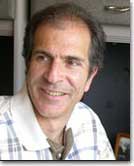 Rick Altman is the host of the PowerPoint Live User Conference and a long-time crusader of bringing a sanity check to the presentation community. Through multiple books, training videos, dozens of online articles, and now a blog and webinar series, Rick offers advice, strategy, and technique for those seeking to master their presentation projects.
Rick Altman is the host of the PowerPoint Live User Conference and a long-time crusader of bringing a sanity check to the presentation community. Through multiple books, training videos, dozens of online articles, and now a blog and webinar series, Rick offers advice, strategy, and technique for those seeking to master their presentation projects.
PowerPoint Live is attended by over 200 annually and has become one of the must-attend events for those in the business of creating and delivering professional-grade presentations.
Who Should Purchase:
- Communications professionals who want to enhance their partnership and value to the business.

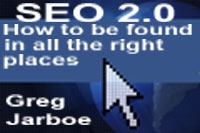



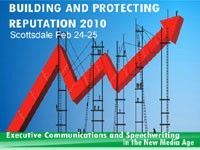
 David Murray
David Murray